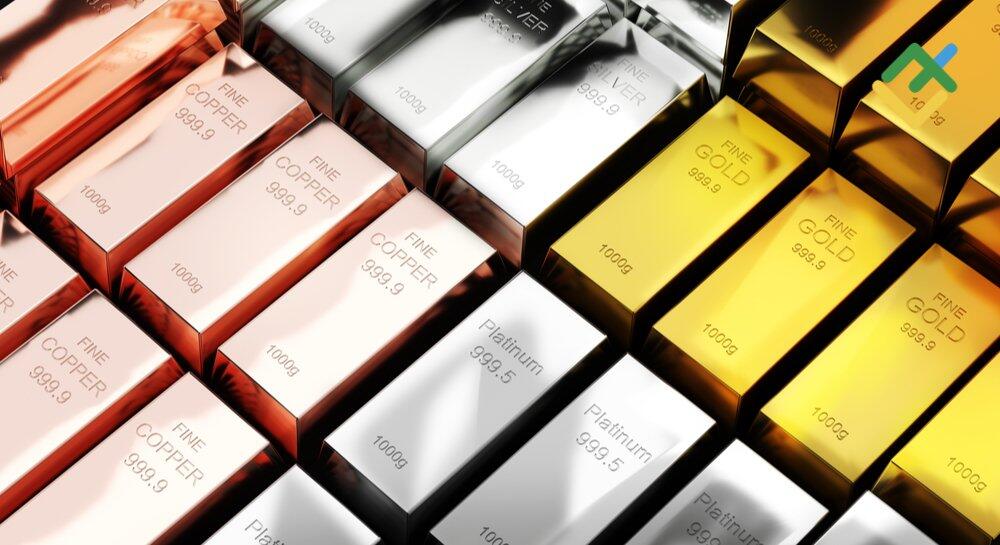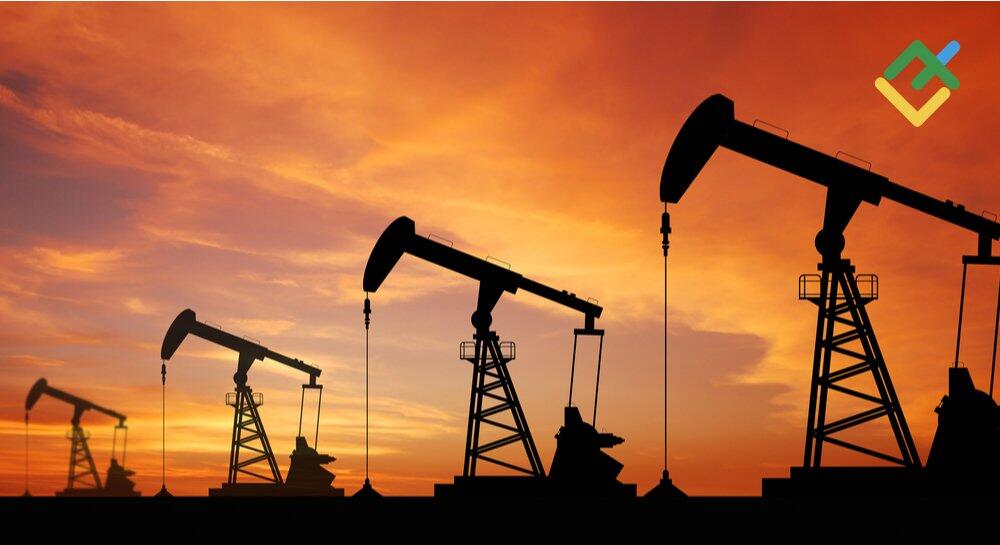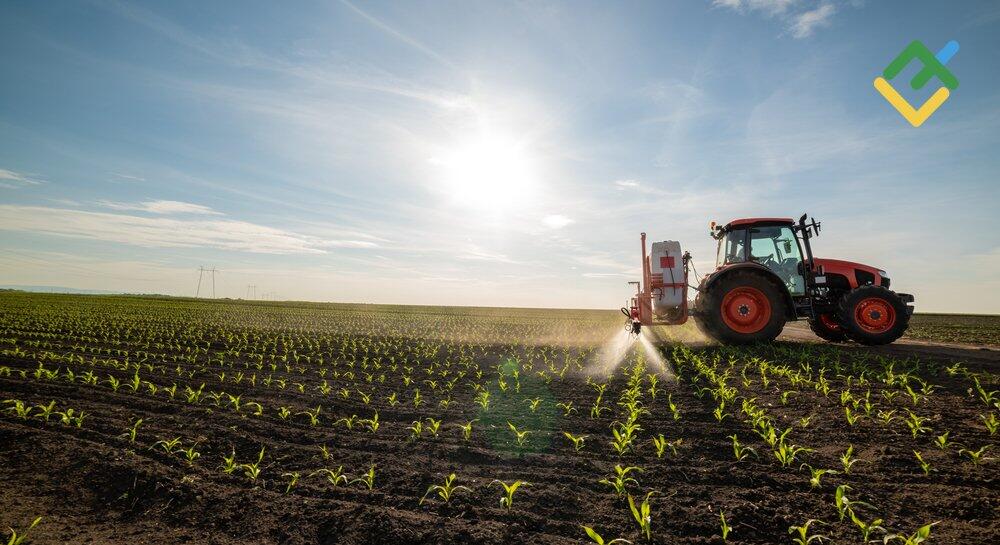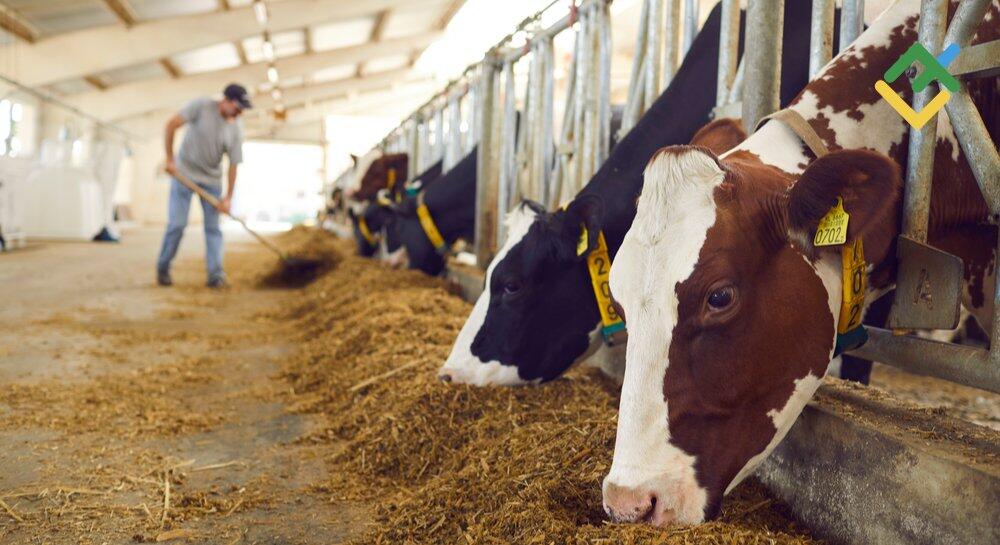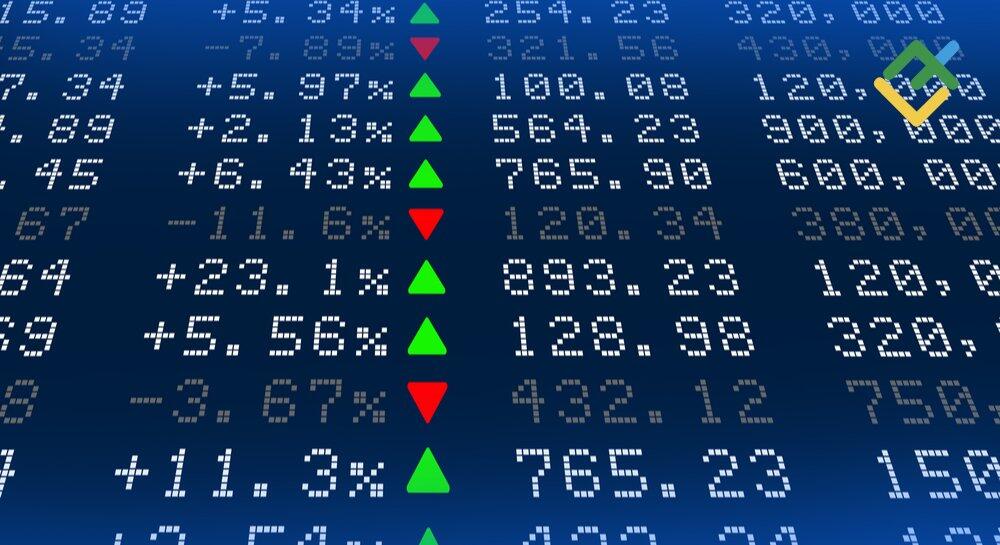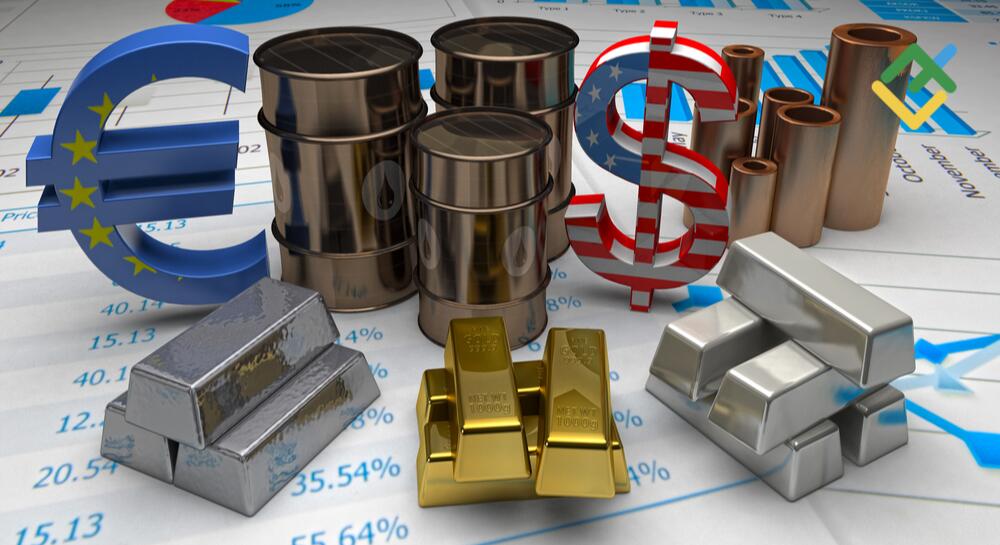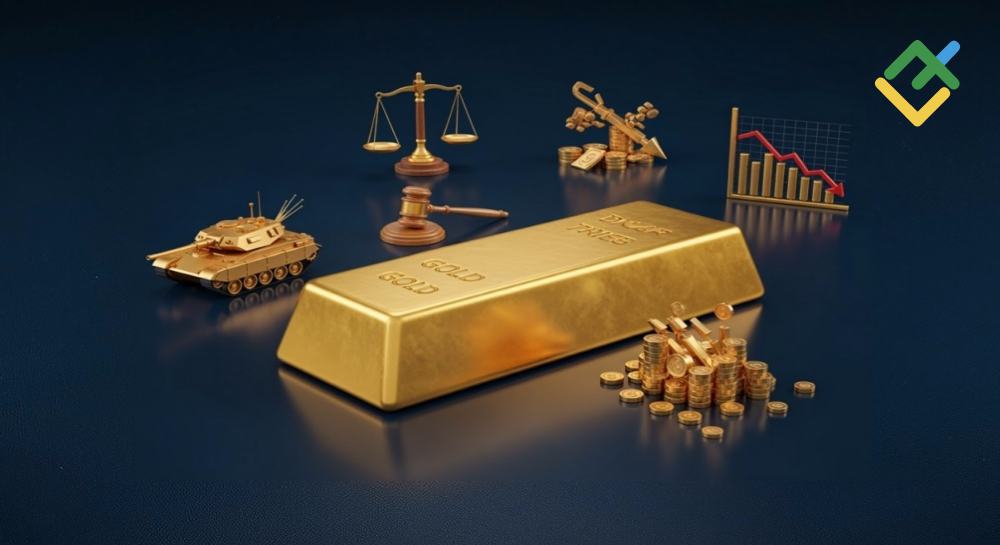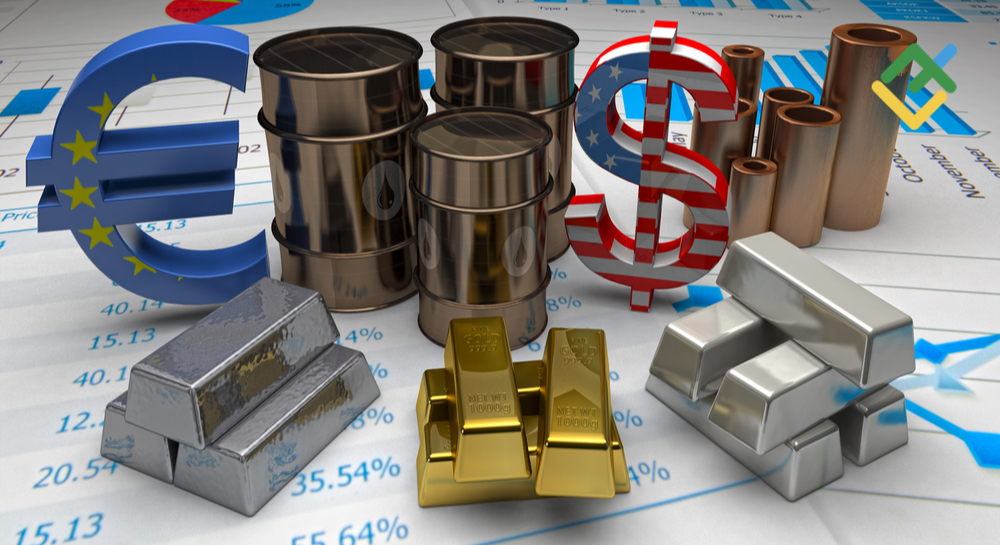
You may wonder why we called the commodity market an unusual one. What is so special about it? If you are engaged in forex trading or speculate on the stock market, can you trade commodities? How does commodity trading work? Which commodities should you trade, and which should you avoid? You will find the answers in our guide to commodity trading.
The article covers the following subjects:
Commodities: Basics
Let’s start with a definition. Although you know traded commodities such as gold, oil, natural gas, and grains, it’s worth knowing the general definition.
A commodity is a good used in commerce. It is an interchangeable asset that can be exchanged for a good of the same type. Commodities are raw materials that are mostly used as component parts of other goods.
There are commodity standards both in production and trading. Although commodities’ quality slightly differs, they are commonly similar. If we talk about trading, commodities should adhere to a basic grade standard. This standard must be met by a commodity if it is to be used as an actual futures contract’s asset.
Commodity Categories
Commodities are usually divided into four types, including energy, livestock and meat, metal, and agriculture. We will begin with metals as they are the most-traded commodity instruments.
Metals
One of the most frequently traded commodities in the group of metals is gold. Gold is considered a safe-haven asset. This means that investors and traders put their funds in it in times of risk-off sentiment. Gold has proved to be one of the most reliable assets. It means that its value won’t plunge significantly, leading to enormous losses. Traders use this feature of the gold market to predict its price direction. If market sentiment is negative, the market price of gold increases.
There are other metals that can be traded. They are silver, copper, and platinum.
Silver is a less reliable asset than gold. Still, it provides interesting opportunities, especially for active traders. Silver can be considered for short- and medium-term trades.
Copper differs with its consistently high demand. It’s used in different spheres, including electrical equipment, plumbing, engineering, and cooking utensils.
London Metal Exchange (LME) is considered one of the most popular commodity exchanges for metals. The LME allows for trading commodity futures and options contracts on a wide variety of metals including aluminum, zinc, cobalt, copper, lead, and many others.
Energy
Energy is another well-traded type of commodity. This category includes crude oil, heating oil, gasoline, and natural gas. If you consider trading energy commodities, you will more likely trade crude oil.
There are two main oil benchmarks: Brent and WTI. Although crude oil is a huge topic to discuss, there are basics you need to know. Brent and WTI are used as benchmarks for prices of other oil grades and variants. The price is determined by the similarity of a grade with the benchmark. Brent crude oil is used as a norm for European and Asian markets. At the same time, WTI is a standard for the Western Hemisphere.
When we talk about crude oil trading, we should consider some crucial factors that affect its price. The main factors affecting oil prices are demand and supply. Any increase in supply and decrease in demand of this physical commodity leads to value depreciation. Conversely, if supply shortens and demand increases, oil prices increase. The development of an alternative energy source could lead to a fall in global oil prices. The oil industry is always in the middle of political issues between countries. Sanctions and conflicts that affect oil companies and respectively the supply of this asset can lead to an increase in its value.
Aside from trading oil, investors could consider speculating on the prices of natural gas. This commodity is used for various industrial, residential, and commercial purposes.
Agriculture
Agricultural commodities are traded less. This category includes coffee, sugar, cotton, soybeans, corn, wheat, and rice. These assets are also referred to as soft commodities. meaning that they are grown and harvested, as opposed to being extracted from the ground like oil or minerals. Agricultural commodity market prices mostly depend on a weather factors. If supply declines, the price of an agricultural asset can rise. Increased demand can also boost the price of an agricultural asset.
We have listed many agricultural commodities. However, not all of them are traded widely. Coffee and sugar are the most popular trading instruments. Coffee is the second most popular commodity for trading after crude oil. Sugar is a promising market. Both white and raw sugar are represented in the market. Sugar is used as a sweetener and as an input in ethanol production.
Livestock and Meat
This category is the smallest. It includes pork bellies, lean hogs, live cattle, and feeder cattle. All types of livestock also relate to soft commodities.
What Makes Commodities Trading Special?
It doesn’t matter which asset you trade; trading is the process of buying and selling a financial instrument. You can buy commodities via exchanges (such as New York Mercantile Exchange, Chicago Mercantile Exchange (CME Group), and others) or via commodity derivatives.
If all markets were the same, there wouldn’t be any reason to trade different assets. Every market has its own unique features.
-
The first thing that diverges financial instruments is factors that affect their value. When we talk about the commodities market, we should understand that a supply/demand factor is a keystone helping to predict commodity price movements. The basic rule is: when supply increases, an asset’s price decreases. When demand increases, an asset’s price rises, too. Thus, to predict the price direction of an asset, you should define what could affect its supply and demand. After that, you should follow the news about the factors that affect supply and demand.
-
Trading on commodities markets can be highly volatile. That’s why traders should gain experience before entering a commodity market. Even the safe-haven gold has an increased level of volatility.
Why Should You Trade Commodities?
There are numerous reasons why investors choose traded commodities over other assets, especially bonds and stocks.
Refuge Asset
Not all commodities are considered safe-haven assets. For instance, oil which is among the most volatile commodities, can’t be a refuge asset for sure. However, precious metals such as gold can be used to hedge your funds in times of enormous market volatility and uncertainties caused by global political and economic events.
Aside from keeping your funds safe, you can gain income trading a particular commodity that may increase in value in periods of market turbulence (e.g., gold).
High Returns
Before you dream about high returns, you should remember that high profits are accompanied by a high risk of losing it all. For instance, oil is a highly volatile asset. If you are a trader, you can use enormous market swings to multiply your investments. Still, you should understand that only experienced traders can use increased volatility in their favor. You should know how to act when there are increased price movements.
Diversification
Commodities are often used for portfolio diversification. If you want to make investments diversified, you should choose assets with a low correlation. For instance, stocks are risky assets, while most commodities are safe. Thus, you can invest both in the stocks and commodities you like. If the market doesn’t follow your prediction for one asset, you will be able to change the situation to succeed with another asset.
What Affects a Commodity Price?
As we have mentioned several times, the supply/demand factor leads the commodity market. However, there are other aspects that drive it.
Market Sentiment
Let’s begin with market sentiment. This determines the price direction of every market. Market sentiment is based on global political and economic issues. In times of risk-on sentiment and a stable global environment, risky assets such as crude oil appreciate. At the same time, global economic and political issues can boost the price of safe-haven commodities such as gold.
USD
When you trade commodity CFDs, it will be paired with the US dollar. Thus, you should pay attention to the US Dollar (USD) rate to forecast the price direction of the commodity you are interested in. If the USD appreciates, the commodity trade price will most likely go down.
Substitution
As the world constantly develops, alternatives to commodities are created. The value of commodities will depend on the demand for alternatives. If more people prefer an alternative, the commodity will depreciate.
Weather and Seasonality
Commodities are represented by agricultural products as well. Logically, the weather factor will be highly important as it will determine the supply rate. Here, we should also talk about natural disasters. A natural disaster will lead to a decline in supply. Thus, it may boost prices in the short term.
Emerging Markets
Commodities are used and produced in developing countries. Thus, events in emerging countries can have a large impact on commodity prices. China is an example. The events in this country can affect crude oil prices, and the market value of copper, iron, etc.
Past Performance
To determine the price direction of an asset, you can use its past performance. All significant events are reflected in significant price fluctuations.
Ways to Invest in Commodities
There are several ways to trade commodities. Let’s consider which one will suit you best.
CFD
The CFD, or contract for difference, is the easiest and most accessible way to trade commodities. CFD trading is presented by almost every Forex broker for online trading. Thus, if you already trade currencies, commodities trading is done the same way and on the same platform with the same trading account. Commodity CFDs enable spread trading. The CFD is a derivative product that makes it possible to trade assets, speculating on price movements. When trading CFDs, you don’t own the underlying commodity. You can both buy and sell it, profiting from both activities.
Trading CFDs allows for the use of margin. Thus, you can use leverage to increase your initial capital. However, it’s crucial to remember that CFDs are complex instruments and leverage trading implies high risk. Not only is it possible to gain potentially higher profits but also there is a large possibility of losing money rapidly from retail investors’ accounts, especially in case traders lack experience and skills in trading this type of financial instrument.
Commodity Futures Trading
Another common way to trade commodities is a commodity futures contract. When you trade most futures contracts, you take an obligation to buy and receive an asset on commodity futures markets at a predetermined price at a specified time in the future (when the contract expires). At the same time, the seller has an obligation to deliver the underlying asset when the futures contract expires. Commodities futures trading is possible for any financial instrument.
Usually, the users trading futures contracts on the commodity market are divided into commercial or institutional buyers of commodities and speculative investors. Institutional users use the contracts to organize the budget process and protect their business from futures price changes.
Speculative investors can use commodity futures contracts to apply strategies for short-term investing. Their aim is to profit from a change in the asset’s price. However, such investors close their positions before the expiration date of the futures contract. As a result, the delivery of the asset never takes place.
Commodities Stocks
The stock and commodity markets are always compared. Still, you can combine these markets. For instance, you can invest in the stocks of a company that is somehow related to the commodity asset you are interested in. If you are interested in natural gas, you can invest in the stocks of the leading gas producers. Suppose you would like to deal with gold; you could invest in mining companies.
Investing in stocks is supposed to be less volatile than trading futures. This is a great opportunity for novice investors. Still, you should remember that penny stocks are the least reliable assets for investing.
However, you should bear in mind that this method of accessing the commodity market is indirect. Stocks and commodities have a low level of correlation. A stock’s price doesn’t depend on a commodity’s price.
Commodity ETFs, ETNs, and Mutual Funds
Exchange-traded funds or ETFs and exchange-traded notes or ETNs are traded the same way stocks are. A commodity ETF allows investors to speculate on fluctuations in commodity prices or the price of a basket of commodities. At the same time, they don’t invest directly in futures markets.
ETFs commodity trading and ETNs commodity trading are not available for all commodity assets. These instruments usually don’t require special brokerage retail investor accounts.
As for a mutual fund, it can’t be used to invest directly in commodities. Still, they can be used to invest in the stocks of a company that relates to a commodity asset you want to trade.
Physical Commodity Purchase
When you trade futures, you’re not buying or selling the physical commodity itself. Futures traders don’t actually take delivery of millions of barrels of oil or herds of live cattle – futures are all about betting on price changes only. However, for precious metals like gold and silver, individual investors can and do take possession of the physical goods themselves, like gold bullions, coins or jewelry.
These investments give you exposure to commodity gold, silver and other precious metals and let you feel the actual weight of your investments. But with precious metals, transaction costs can be higher than with other commodities, so it’s important to do your homework before making any decisions.
In general, physical commodities have higher prices than futures contracts, and they can be harder to sell when you want to cash out your investment. If you’re interested in this type of trading, do your research and talk to a commodity advisor to see if it’s the right choice for your investment portfolio.
Is It a Good Idea to Trade Commodities?
Although commodity trading has its pitfalls, it provides numerous opportunities. First of all, if you want to become a professional trader, you should know how to trade different instruments. All assets have their features. So, the more you try, the more experience you will gain.
However, before you start commodity trading, you should define which asset suits you the most. Remember that more popular assets have a higher degree of liquidity. Thus, it’s less risky to trade them. If you are a beginner trader it’s reasonable to consult a commodity trading advisor who could help you with the choice of an asset and the development of a trading and risk management plan.
Also, you should remember that widely-traded crude oil is on the list of highly volatile commodities. If you don’t have a good trading strategy for risky assets, don’t buy or sell oil as an underlying asset. Suppose you are a novice, choose more reliable assets such as gold. But keep in mind that in the short term, the gold market can suffer increased volatility, too.
Tips for Commodity Traders
We gathered some tips that can help you start trading commodities.
-
Before you enter the market, you should learn more about every asset you would trade. For instance, if you are interested in agriculture, read more about the coffee market. Although the supply/demand factor is the leading barometer of price direction, you should always understand which factors could affect the market’s direction.
-
Don’t run for high rewards. High rewards lead to increased risks. If you are not experienced enough, you could lose a lot.
-
Before opening a position, check all the factors that could affect the asset’s value. An economic calendar and the news are the main sources of information when you trade commodities. Pay close attention to the global market sentiment.
-
When you are sure about the asset and its direction, remember about the risk-reward ratio. The potential reward should be at least three times larger than the potential loss.
The Best Time for Commodity Trading
There is no best time to start trading commodities as commodity hours are split up by the asset category and the commodity exchanges. Most commodity markets are closed from Friday evening to Sunday. The only advice that can be given to a commodity trader is to get involved at the start of every trading session (Australian, Asian, European, and American) as the degree of market liquidity rises.
Takeaway
Let’s sum up what we have learned about the commodity market.
Commodity trading provides a wide range of opportunities for investors. As it’s presented by various assets — from safe-haven to those with enormous volatility — you should determine the assets you want and can trade. Your ability depends on your skills and experience. Don’t risk if you don’t have enough experience and proven strategies to trade assets with a high level of volatility.
LiteFinance offers online commodity trading. If you are a newbie trader in the commodity market, you can use a demo trading account. The demo feature allows for testing commodity trading strategies and learning how to apply risk management plans as well as fundamental analysis to define the future price of an asset.
Commodity Trading FAQ
Commodity traders buy and sell commodities in the commodities markets. They make money by buying assets at a lower price and selling them at a higher price. They suffer losses when they do the reverse. To mitigate potential risks and not lose money trading various commodity assets, you need to have a deep understanding of this market, practice trading in a demo account, and be able to make quick decisions. You also need to be able to take risks and handle losses.
Commodity trading offers investors the opportunity to speculate on the future price movements of a wide range of assets, from energy commodities like oil and gas to agricultural products like corn and wheat. Commodities can also be traded via futures contracts which are regulated by the Commodity Futures Trading Commission (CFTC) in the United States. Commodity stocks are often seen as a way to hedge against inflation, as their prices tend to rise when inflation is higher. These assets can also be used to take advantage of global economy growth, as demand for commodities increases when economies are growing.
Both markets have pros and cons. The commodities market is highly volatile, which means prices can fluctuate rapidly. However, this also creates opportunities for traders to make a profit. You can trade commodities online through a commodities exchange. Purchasing stocks gives you partial ownership of a company. Stocks tend to be less volatile than commodities, but they can still be risky and could lead to losing money rapidly due to many reasons. The value of a stock depends on the performance of the company, which can be affected by many factors, including the world economy, news events, and even rumors. Which is better? It depends on your goals and risk tolerance.
Commodities can be a great way to earn money, but there are a few things you need to know before getting started. First, it is important to understand how commodity trading works. Essentially, in order to make money, you need to find a buyer who is willing to pay more for the commodity than you paid for it. This can be done by either selling the commodity directly to a buyer or by using CFDs, for example. However, it’s crucial to remember the risk involved. CFDs are complex instruments that can bring you high profits, but on the other hand, they could make retail investor accounts lose money rapidly.
There is no best commodity for trading. The choice depends on your skills and preferences. If you are a professional trader, you can choose risky crude oil. At the same time, if you are a newbie trader, you should consider precious metals such as gold and silver. Before exposing portfolios to any type of commodity, traders should educate themselves about this instrument and develop efficient trading strategies. Otherwise, there is a high risk that can make retail investor accounts lose much money.
The easiest way to start trading commodities is to find a reliable broker or a trading platform. LiteFinance enables the trading of the most popular commodity asset classes. Margin trading allows you to start trading with limited funds. However, note leveraged trading comes with a high risk of losing capital from your retail investor account. Thus it’s crucial to gain the necessary knowledge and experience before you start commodity trading with a margin.
There is no accurate answer. There are various commodities and stocks. Commodity assets include safe-haven gold and risky crude oil. At the same time, there are blue-chip stocks and penny stocks. Both markets experience periods of magnified and low volatility. To increase your potential profits and avoid drastic losses, it’s important to implement robust stock and commodity trading strategies.
The minimum amount required for commodity trading is determined by the broker. If you trade commodity CFD, you don’t have to deposit the full trade value, instead, you can use the leverage that will increase your initial capital. The minimum amount will depend on the broker’s requirements. However, note that money when trading CFDs can not only grow significantly but also be lost dramatically fast, especially if you don’t have enough experience and skills in trading these financial instruments.
Why would we compare stock and commodity trading? The reason is that both markets provide various trading opportunities. Both the stock and commodity markets have risky and reliable assets that can be traded depending on your trading approach. At the same time, commodities are mostly used for short-term investments, while the stock market is more suitable for long-term investing.
Some of the most traded commodities include crude oil, natural gas, and gold. Crude oil is one of the most popular and volatile traded natural resources. The risk of losing money is high, but so is the potential for profit. Natural gas is a riskier commodity than crude oil, but one that can be more volatile and therefore more profitable. Gold is a safe haven for investors in times of uncertainty in the global economy. The price of this asset can fluctuate wildly, so it’s important to do your research before investing.
P.S. Did you like my article? Share it in social networks: it will be the best “thank you” 🙂
Ask me questions and comment below. I’ll be glad to answer your questions and give necessary explanations.
Useful links:
- I recommend trying to trade with a reliable broker here. The system allows you to trade by yourself or copy successful traders from all across the globe.
- Use my promo code BLOG for getting deposit bonus 50% on LiteFinance platform. Just enter this code in the appropriate field while depositing your trading account.
- Telegram chat for traders: https://t.me/litefinancebrokerchat. We are sharing the signals and trading experience.
- Telegram channel with high-quality analytics, Forex reviews, training articles, and other useful things for traders https://t.me/litefinance
The content of this article reflects the author’s opinion and does not necessarily reflect the official position of LiteFinance. The material published on this page is provided for informational purposes only and should not be considered as the provision of investment advice for the purposes of Directive 2004/39/EC.
{{value}} ( {{count}} {{title}} )
This post is originally published on LITEFINANCE.

